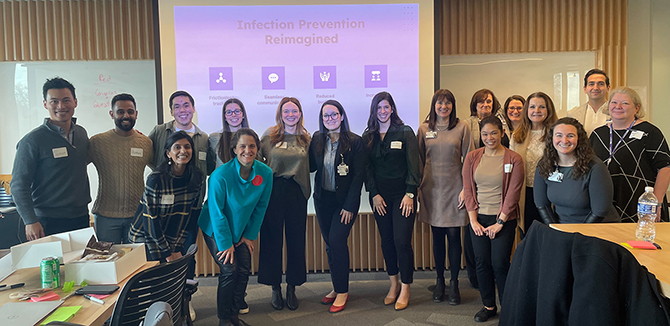Infection Prevention Reimagined
MMM students put their learning into practice to help Northwestern Medicine in its fight against the spread of pathogens.

Long before the COVID-19 pandemic put a spotlight on infection controls in medical facilities, hospital administrators were already intensely focused on ways to minimize the spread of potentially harmful pathogens.
That was the case at Northwestern Medicine, a collection of 11 hospitals that includes the No. 1 hospital in Illinois and ninth-ranked hospital in the country, according to U.S. News & World Report. Despite the accolades, Northwestern Medicine is always looking to improve its processes.
To do that, the health system turned to Northwestern's MMM program, a dual-degree program between Northwestern Engineering and the Kellogg School of Management.
A team of MMM students — Saranga Arora (MMM '23), Luis Cerro (MMM '23), Peter Lin (MMM '23), MacKenzie Miller (MMM '23), Aabhas Sharma (MMM '23), and Katie Theiss (MMM '23) — was asked to review infection prevention protocols and identify opportunities for improvement. The project was part of the MMM program’s Business Innovation Lab (BIL), where students apply what they have learned throughout the program into practice with an industry partner. They worked collaboratively with representatives from Northwestern Medicine during the 10-week course.
In the process, the students saw the strength and flexibility of the MMM program’s guiding principle: human-centered design. The principle is based on the theory that to create the most life-changing products and services, designers must get to the heart of what potential end-users truly want and need.
“This project was a great lesson of how the human-centered design process can be applied to effectively tackle unfamiliar and complex challenges,” Luis Cerro (MMM ‘23) said. “We all walked into this project with no prior experience with infection prevention in hospital systems, but the design thinking process prompts you to be curious and to act as a facilitator.”
As that facilitator, students needed to understand not only the infection-control pain points in the system but also:
- Which stakeholders were most frequently burdened by those pain points
- What those stakeholders desire from a better experience in this process
- How each of these improvements should be prioritized and phased by Northwestern Medicine
- That understanding helped the students narrow the focus that led to their recommendations.
“The biggest challenge was prioritizing the issues that our team could focus on in our short 10-week project,” Aabhas Sharma (MMM ‘23) said. “This is where our MMM training came into play and helped us strategize so that we could work towards a meaningful solution.”
Along the way, the students used much of what they learned during their time in the MMM program. For example, MacKenzie Miller (MMM ‘23) said she used the customer research methods she learned in the Research, Design, Build class and the prototyping skills she picked up in the Mindful Product Management course.
“BIL is the first opportunity MMM students get to apply all of the tools in our human-centered design and innovation toolkit to a real-world problem,” she said. “It was extremely valuable to go through the entire process with a real organization.”
The experience was made even more rewarding by the warm reception their ideas received when they gave their final presentation to Northwestern Medicine executives, Miller said. Those ideas included incremental steps for improved communication processes, a refreshed user experience to help hospital staff book and access follow-up testing and care, and incentives for employees to complete infection prevention processes.
The students said what they learned during BIL will be valuable long after they graduate. Miller said the project was especially important to her because she plans to work as a consultant on projects in the healthcare industry.
"I'm passionate about making healthcare more human, more patient-centered," Miller said, "and the skills I learned in MMM will be essential to helping me empathize with patients and create solutions that are built with their needs in mind."
Even those without plans to continue in healthcare said they found their BIL experience important to their futures.
“The human-centered design process can be applied to any industry and process because it puts people first and prompts you to adopt a genuinely curious and empathetic approach,” Cerro said. “BIL is the course that brings it all together.”
